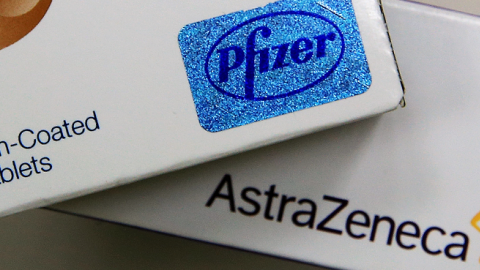Pfizer is an American pharmaceutical company that makes Viagra to increase many men's sexual activity, and Lipitor to prevent strokes and heart attacks (my lay language, not the more precise Pfizer claims). AstraZeneca is a British pharmaceutical company that makes cancer and other drugs. Pfizer says AstraZeneca faces "difficult challenges" because patents on many of its drugs will expire soon and offers to be helpful by buying the company for $106 billion (£63 billion). AstraZeneca says no thanks, it has a bright future as an independent company, and if it were to sell, it would want a lot more than a mere $106 billion. Pfizer says fine, we want "constructive engagement" with you, and might up our offer if you show us the books, to which AstraZenaca replies, in essence, "not on your life," even a life prolonged by the use of both companies' drugs.
Oh, by the way, Pfizer wants to save on its taxes and get access to the cash it has stashed away outside of the reach of the rapacious U.S. tax collector, preferring instead the welcoming lower rates on offer by UK Chancellor of the Exchequer the Rt. Hon. George Osborne. By one reckoning, Pfizer could save about $1 billion per year in income taxes, and finance the merger with some of the $57 billion in cash it has stashed abroad, rather than repatriating it into the welcoming arms of the IRS. Some experts doubt that the savings would be so great, but all agree that we are talking about a lot more than petty cash.
Not so fast, say politicians on both sides of the Atlantic. Long-time senator Carl Levin is a Democrat from Michigan. He learned a thing or two about finance when serving as president of the Detroit city council as it piled up the obligations that have brought the city to bankruptcy. He says he will introduce legislation to prevent Pfizer fleeing our shores, never mind the constitutional bar against such retroactive legislation, which Levin says he does not take lightly. Such "inversions," which is the term applied to the strategy of acquiring a foreign company and re-incorporating abroad in a relatively low-tax jurisdiction, Levin says "threaten to devastate federal tax receipts." Fortunately for Pfizer, Levin is retiring from the Senate at the end of this year. Unfortunately for Pfizer, Senator Ron Wyden, the Oregon Democrat who chairs the Senate Finance Committee, says he plans to take steps "immediately" to prevent "hollowing out the tax base," and governors in states with Pfizer facilities are lining up to prevent this inversion lest jobs follow taxes overseas.
Our opponents of the free flow of capital have allies in the UK. They have had no objection to the inflow of capital from Russian oligarchs snapping up multimillion dollar condos and an NBA team. And the welcome mat is always out on Fifth Avenue and other venues for the wild-spending Arab despots and their entourages of courtiers and burqua-clad women, never mind their financing of the anti-Western preachings of some of their clergy.
These days it is all about jobs, and the pharmaceutical industry is contracting, Pfizer alone having cut 50,000 jobs worldwide since 2005. Ian Read, Pfizer CEO, indicated that process will continue. Britain's politicians remember that Pfizer promised no job cuts when it acquired Wyeth in 2005, a promise it quickly broke, and in 2011 closed its research facility in Sandwich with the loss of 1,500 jobs. They are demanding patently unrealistic no-job-loss agreements running as long as 20 years from a company in an industry that is contracting. So Read's commitment to keep one-fifth of the merged company's R&D workforce, however large that might turn out to be, in the UK for five years is not given much weight, as are his promises of jobs for Americans after the merger.
Whether AstraZeneca can resist shareholder pressure to open its books in the hope of getting the better offer Pfizer is hinting at while remaining "disciplined on price" we do not know. But we do know that the possibility of more inversions has spooked the political class. Andrew Ross Sorkin reports in his widely read New York Times column that his informal survey of at least a half-dozen bankers turned up "17 incoming calls from Fortune 500 companies requesting an analysis of merger prospects that involve an inversion." There is some urgency in these requests, since the possibility of legislation putting the clamps on such deals looms large, at least in the minds of corporate board members who have an obligation to maximize shareholder value. As does the fear that all available foreign targets will have found partners, and when the music stops, they will be left standing, as Joseph Johnson, a partner in the law firm of Goodwin Procter said.
Walgreens, the drug chain, is considering structuring its acquisition of Alliance Boots to enable it to reincorporate in Switzerland, where Boots is based, before legislation is passed to bar the way. But legislation, if any, would most likely be part of an over-all reform of the American tax system. And that won't happen until after the 2016 presidential elections, if then.
Meanwhile, most congressmen are not concerned. They know there is a huge difference between the de jure 35 percent corporate tax rate, allegedly inducing flight to more benign jurisdictions, and the lower de facto effective rate, paid after all the breaks built into the tax code with the help of lobbyists are taken into account. As for the $2 trillion in American corporate cash supposedly trapped overseas to avoid taxation on repatriated earnings, it is not really needed by most companies here. Few are holding back investments for lack of cash, and most can borrow at derisory interest rates should they need cash.
Result: lay-offs by pharmaceuticals will continue whatever happens, there will be more inversions in several industries, but most corporations have complex reasons for choosing a home, and taxes are only one of them. The U.S. tax base will not be "hollowed out" by inversions. That job will be left to congressmen and the president, as they pile tax upon tax.
















